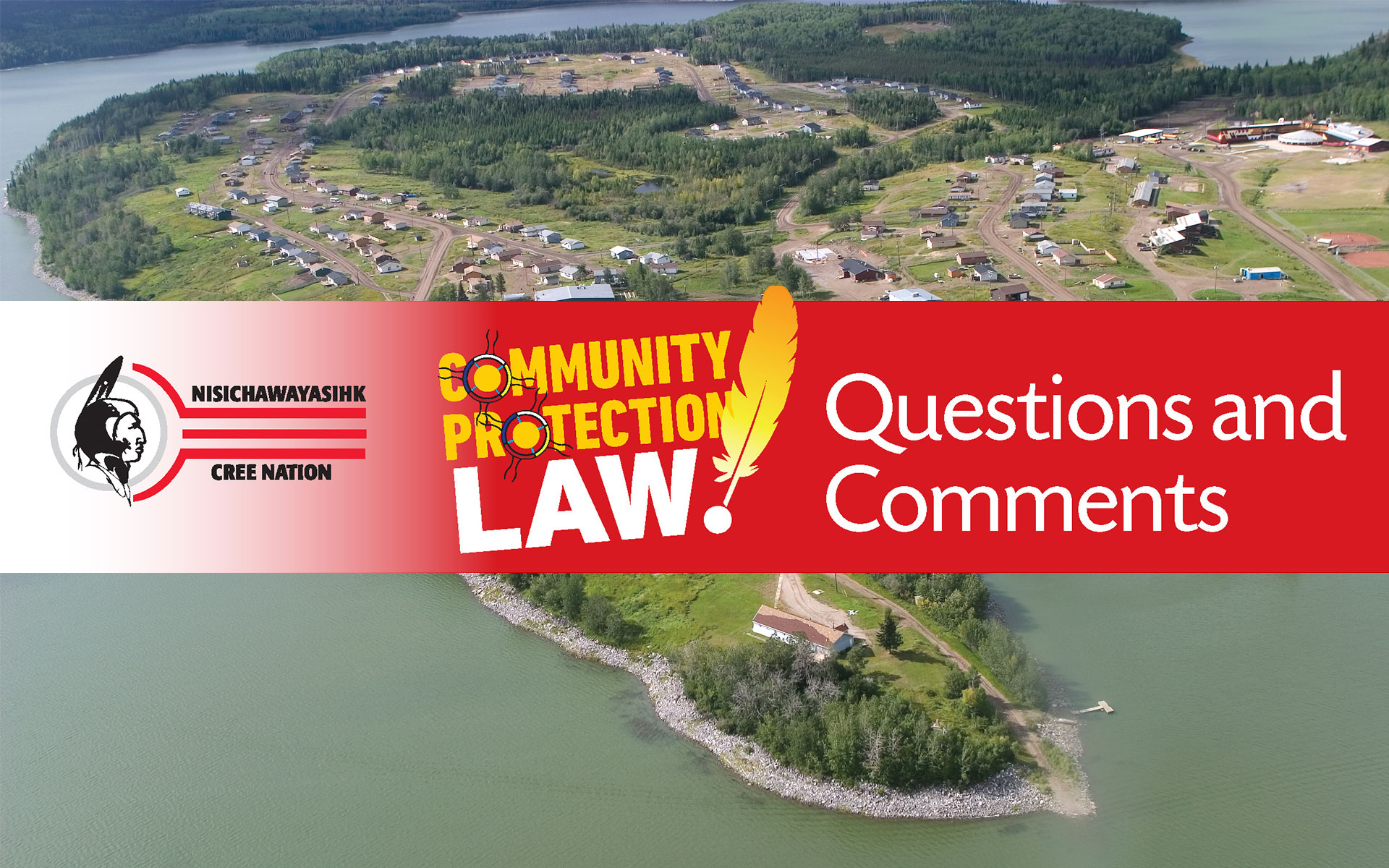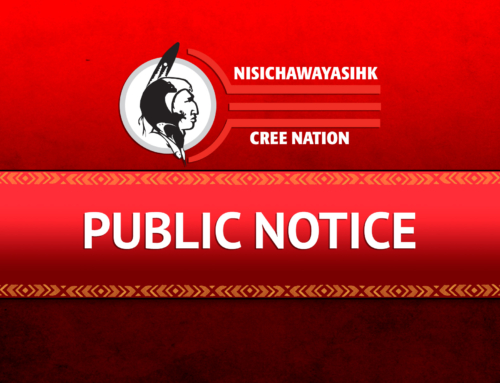Q: Constitution/ Land Code Are they two separate laws? Will the land code be part of the constitution?
A: They are two separate laws. The goal is to have the Land Code become a land law under the Constitution once the self-government process is concluded down the road. In the meantime, the law making processes in both documents are the same.
Q: If we have our own Justice System, are we still able to use our own legal advisors?
A: Yes and if people do not have their own legal advisors, NCN may look at hiring legal counsel or other advocates to represent people for certain issues similar to some of the other justice models we have examined but that would not be immediately as we are undertaking research and will present more information to the community.
Q: What protections does NCN have, if someone challenges these laws and ends up suing the Nation?
A: The Emergency Measures Law gives Chief and Council the authority to put different rules in place if there is an emergency like the coronavirus pandemic. For example, the Community Protection Law allows certain amounts of alcohol or cannabis to be transported onto NCN Lands, but when the lockdown went into effect, an Order in Council was issued to over-ride that law due to the pandemic. In normal circumstances, Chief and Council cannot simply over-ride a law but in this situation it can for a limited period of time (in this case during the pandemic).
Q: Will NCN laws be respected by Canada and Manitoba?
A: Hopefully as there is a lot of discussion underway across the country about recognizing Indigenous laws.
Q: What is justice, what does it mean?
A: This is a good question and there needs to be further discussion with the community.
LANDS:
Q: Do the laws apply to NCN lands?
A: The Community Protection Law applies to NCN lands excluding the Mystery Lake. The check stop can be on NCN Lands or adjacent to NCN Lands.
Q: Why isn’t Mystery Lake included?
A: There are a number of federal and provincial laws that apply to regulate the operation of the hotel and cannabis operations in particular. Given there is a bar and a beer vendor located on these lands it did not make sense to have the permit system, check stop, etc. in place.
Q: Mayor and Council of the Metis Settlement have challenged us about searching and confiscating alcohol. The majority of the residents in the Metis Settlement are NCN Citizens. Do they have to abide by the CPL?
A: Almost all residents of the Metis Community are NCN Citizens and they must abide by NCN Laws while on NCN Lands.
Q: What about those living or using resources on Crown Lands?
A: The law will apply on NCN reserve lands and it may be amended in the future to extend to NCN’s traditional territory.
Q: Do NCN Lands include the reserve lands, the TLE lands or entire RMA?
A: “NCN Lands” means the reserve lands more particularly described in Aski-Pumenikewin.
Q: Can a trapper lose trapline license if they violate the Community Protection Law?
A: Further discussions with Manitoba are necessary.
Q: Highway 620, is that a provincial road?
A: Yes but part of the road is on NCN Lands.
Q: What if a person wants to make their own wine?
A. You will be allowed to travel south of Thompson within Manitoba only and will not have to isolate upon your return. You must register at the check-stop when you leave and when you return and you must observe the restrictions on indoor and outdoor gatherings, social distancing and other public health measures, like frequent hand-washing.
ENFORCEMENT:
Q: Are the RCMP going to be aware of these laws and enforcing them?
A: Yes, they are aware of the law and the FNSOs will continue working collaboratively with the RCMP to enforce this law and other laws.
Q: What if the people don’t want this law?
A: The people approved the NCN Constitution and the Land Code. Both set out how laws are to be developed and approved. The process was followed for this law and if amendments are required in the future then the law can be changed using the processes in the Constitution/Land Code.
Q: Where will a person be imprisoned?
A: The focus is not on putting people in jail. The focus is on restorative justice so the person has a chance to change their behaviour.
BANISHMENTS:
Q: Are banishment orders legal as a Norway House Case man banished, challenged it and won?
A: In that case, the person won based on the fact that there was no “Law” providing the authority for the BCR to be issued to banish the person. The Community Protection Law provides authority for Council to issue an order. The person can then apply after at least 5 years to the Peacekeepers Tribunal to return to the community.
Q: How will banishment work?
A: Community input was that a person should wait at least 5 years before being able to apply to come back to the community. If sentenced to jail then must wait for at least 5 years from the date of release to apply to the Peacekeepers Tribunal.
Q: Will a person have to prove they are rehabilitated?
A: Yes, there are criteria for the Peacekeepers Tribunal to consider.
CANNABIS:
Q: Can we grow cannabis?
A: It is illegal under Manitoba law.
Q: Can FNSO’s test drivers for smoking cannabis while driving?
A: The FNSOs do not have the equipment or authority for this. This is a role for the RCMP.
CHECK STOPS AND SEARCH ORDERS:
Q: If a person is a known drug dealer/bootlegger, who is going to search the house?
A: FNSO would have the authority to search if Chief and Council grants a Search Order under the Community Protection Law. The RCMP may provide back up support if the FNSOs have concerns about public safety while executing a Search Order issued by Chief and Council.
Q: If a passenger is holding drugs under the seat do the FNSOs they have the right to search your vehicle? Is that invasion of privacy?
A: Short answer is that vehicles can be searched in accordance with this law. There is less of an expectation of privacy in relation to vehicles than houses for example. Again, Charter rights are not unlimited and Section 1 of the Charter applies to this law.
Q: Will the FNSO have a search warrant to search vehicles?
A: No they won’t, the law gives them authority to search and they will use their discretion. If a person does not wish to have their vehicle searched, then they can refuse but will not be allowed onto NCN Lands. It is a choice. There are special rules for medicine bundles.
Q: Does Chief and Council have to approve the granting of a Search Order?
A: Yes, a quorum of Council must approve the order.
Q. Will workers from southern Manitoba and out of province be allowed back into the community to work?
A. Yes, contract workers and construction workers can return to the community to work, including those from out of province as long as they comply with a plan pre-approved by the NCN Health Director in consultation with the office of Manitoba’s Chief Public Health Officer, FNIB, the northern regional health authority and Chief and Council.
Q: If one person has open liquor in the vehicle, will the entire amount in the vehicle be confiscated?
A: Yes, as it is a violation of the law to have any open liquor in the vehicle. It must be sealed and properly stored.
Q: Can I take wine home from a restaurant under this law?
A: Yes, if the bottle of wine is corked and sealed in a bag and it is stored properly in the vehicle in the trunk or behind the last seat.
Q: How was Wezzie (Westminster Sherry) banned in the past?
A: The Wezzie ban was followed because Citizens’ had respect for the leadership’s decisions and actions. Many in our community still have that same respect toward leadership today but there are also a number that do not. Chief and Council have tired to find a balance between individual and collective rights. As parents and as a community we must take responsibility for the negative actions that are hurting our community.
Q: What about contractors?
A: They will be required to abide by the law. Pamphlets have been delivered to the various project managers to help ensure workers know about NCN’s laws.
Q: How will people be able to pick up prescription meds for other people? For example, some Pharmacies don’t seem to care who picks up the medications but they should be notified to only allow people who are authorized to pick them up.
A: We have added this to the implementation list.
Q: What will happen if parents are bootlegging with kids in the home?
A: CFS and the RCMP will be contacted.
Q: If an issue arises that requires a Search Order to be issued will a quorum of Chief and Council be readily available and how will it be processed?
A: Council will need to be available to consider the request. They must act reasonably and consider all of the factors to decide whether there are reasonable grounds to issue the Search Order.
Q: Will this law be the perfect solution to solving the problems we have?
A: No law is the perfect solution, but the question is will it help reduce violence and encourage people to assume responsibility for their own choices.
COMMENTS:
1: We need to define NCN lands, adjacent lands, traditional lands, ancestral lands.
2: Would you rather have NCN develop our own laws or keep the status quo and have another Government dictate to us?
3: Some vehicles coming through check stops have “Know Your Rights” stickers.
4: There needs to be amendments to hold employees to a higher standard. Teachers often feel laws don’t apply to them because of their union. Often employees mock FNSO’s and C&C. There has to be a total buy-in from all employees and NCN organizations.
5: There needs to be a community plan to address social issues, for example, parental responsibility.
6: Community Protection Law is a good start.
7: It is helpful to get stats from Wellness Centre (CFS) re: kids in care due to alcohol/drugs.
8: Concerned a person can apply for Family Allowance once the kids are returned home – the issue has been raised but never addressed.
9: Need to do outreach to external agencies that do business in NCN.
10: Community needs block parents or known safe houses.
11: Lighting in community is inadequate and results in more crime.
12: Since RCMP in community, FNSO’s have lost authority.
13: Justice funding cannot be by proposal, must be core funding.



